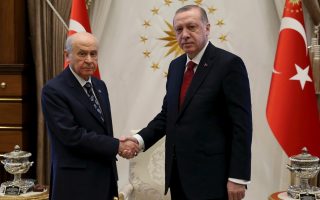Erdogan’s ambitions and the role of Greece

Turkish President Recep Tayyip Erdogan acts as if he’s the leader of a superpower. The grandiosity of his swearing-in on Monday was an additional confirmation of that. Maybe he was jealous of the ceremonies marking the inauguration of American presidents.
Whatever the case, we do not and should not care. It certainly merits analysis, not so much political, but rather of a different sort. Still, that has to do with him and his personality, not Greece.
What we do care about is the fact that the Turkish strongman’s institutional omnipotence was confirmed by, among other things, the presence at Monday’s festive ceremony of leaders from all the countries in our broader geographical neighborhood, including the presidents of Bulgaria, the Former Yugoslav Republic of Macedonia, Bosnia and Herzegovina, Serbia and Kosovo.
Erdogan is weaving a Balkan web that aims at changing the region’s geopolitical balance. That is a development that concerns not only Greece, but others too. Addressing the European Parliament recently, French President Emmanuel Macron clearly stated that he does not want to see the Balkans turn away from Europe and toward Turkey.
Over the past few years, Ankara has funded a plethora of major public projects in the Balkans, such as highways. It has also assisted in building universities and has encouraged moves to strengthen the role of Islam, all these as part of a well-thought-out specific strategy that conforms to its increasing political, economic, cultural and also religious penetration in the region.
In the past 15 years, trade between Turkey and the countries of the Western Balkans has increased from around 350 million euros, to 2.5 billion. Even Serbian President Aleksandar Vucic, during a recent visit to Ankara, noted that “Turkey is the biggest power, the strongest country in the Balkans.”
Greece does not have the luxury of apathy in such a volatile geopolitical environment. It must reassess its priorities, wrap up any loose ends, pursue solutions on any open issues and build further on the partnerships it has already developed in the Balkans and the Eastern Mediterranean.
At the same time, the United States and the European Union have every reason to take advantage of the role that Athens has the potential to play. With well-planned support from Washington, and also from Brussels, Berlin and Paris, Greece could gradually regain the ground it lost due to the economic crisis, and once again act as a true pillar of stability in its geopolitically significant region.





